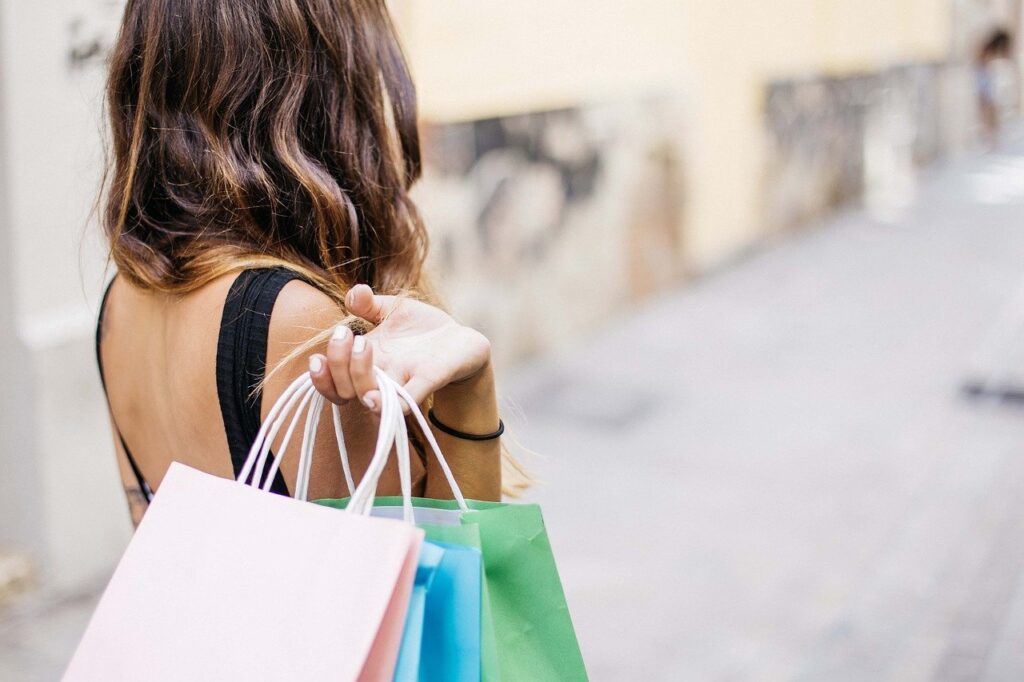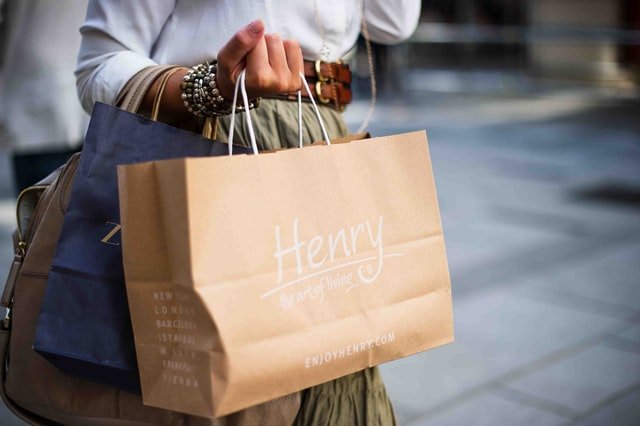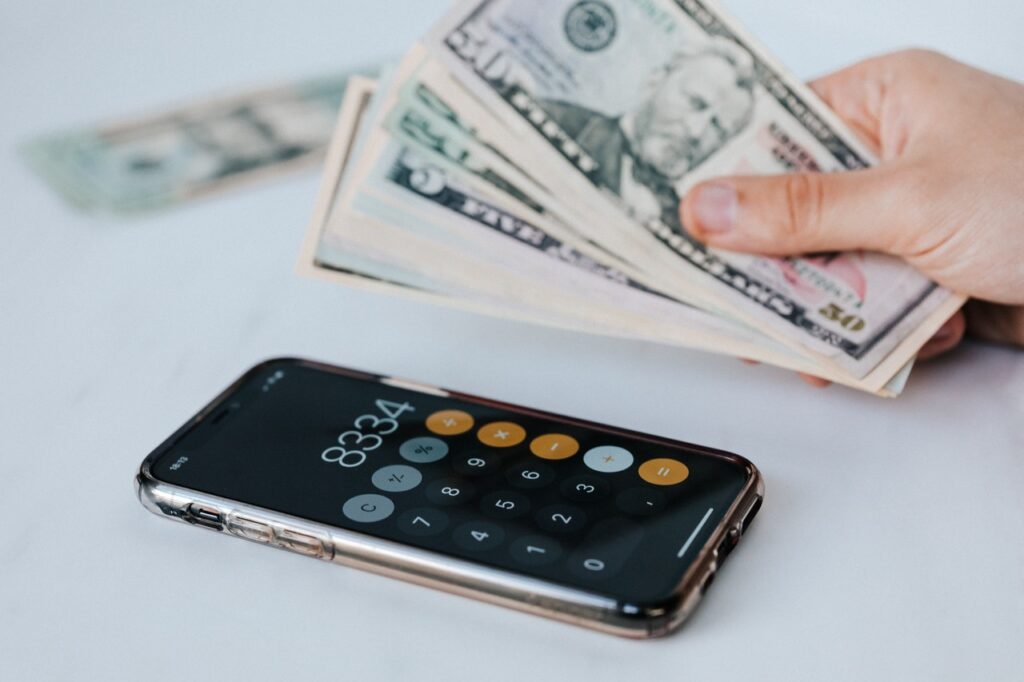- Home
- Types of Addiction
- Shopping Addiction Help & Treatment
Shopping Addiction Help & Treatment
The vast majority of people in the UK view shopping as a regular daily activity, whether to feed those at home or to treat someone to something a little special.
There are those, however, for whom shopping can become a serious behavioural problem.
One study revealed that 4.9% of the general population displayed compulsive buying habits. People were at an increased risk if they were young and female.
Whilst simply spending money seems like a simple activity, there’s actually a lot going on in the brain that makes this act feel pleasurable.
When this happens, an addiction can form.
What Is Shopping Addiction?

A shopping addiction, also known as oniomania, is a behavioural addiction.
Behavioural addictions “produce short-term reward(s) that may engender persistent behaviour despite knowledge of adverse consequences”.
This basically means that people develop diminished control over the behaviour despite its negative consequences.
This is demonstrated through compulsive shopping.
The DSM-5, which is a diagnostic tool for mental conditions, recognises behavioural addictions as “impulse control disorders”.
This includes addictions such as those linked to gambling and kleptomania.
These are different to substance addictions because a person is addicted to a behaviour, not a substance.
Interestingly, it’s likely that where people develop behavioural addictions, they will most likely also have a genetic predisposition.
Many people will have immediate or close family who also suffer from addiction of some sort.
The Different Types Of Shopping Addiction

- Bargain shoppers will buy items they don’t need simply because they feel they’re getting a good deal.
- Bulimic shoppers get caught in “buying and returning” behaviours.
- Compulsive shopping addiction, when people shop to relieve uncomfortable emotions.
- Collectors shop in order to “complete” a collection they may have started and won’t feel “complete” themselves until this is achieved.
- Shopaholics who enjoy the feeling of looking flashy and as though they have all the latest things.
- Trophy shoppers are those who search for specific or unusual items.
Behavioural Addiction: How Shopping Becomes Addictive

The brain’s reward system is activated during shopping behaviours.
There is a release of serotonin and dopamine.
These are two of the brain’s “happy” chemicals, which make you feel good and bring pleasure.
There is also some evidence that behavioural addictions, like substance addictions, are activated in the neural circuits of the brain in such a way that people aren’t as able to make healthy decisions.
This is why a person will repeat the behaviour despite knowing the negative impact that unfolds afterwards.
Shopping addiction is often experienced as a tension before participating in the act, which is commonly influenced by emotional dysregulation.
There are then feelings of gratification during the act of shopping.
Shopping as a behavioural addiction can create a dysphoric state in those who are addicted when they aren’t shopping or want to.
This might be felt as low mood, aggression or dissatisfaction.
This is likened to the withdrawal state of those addicted to substances.
Behavioural addictions, however, aren’t physically or physiologically dangerous during the withdrawal process.
The 5 Phases Of Shopping Addiction

One study revealed that there are 5 phases of shopping addiction.
These are as follows:
- Retail therapy: This is where a person shops in order to try and make themselves feel better.
- Denial: People will deny that they have a shopping problem, or that they shop too much.
- Debt-ridden: Where the person will have accrued many debts due to the amount they have been shopping.
- Impulsive buying: The state of “driving one-self to hasty buying”.
- Compulsive buying: This is where the person knows their shopping is out of control but they’re unable to stop.
Causes Of A Shopping Addiction

As with other addictions, shopping addiction can be influenced by a number of factors.
When several of these factors come together, it can make the development of a shopping addiction even more likely.
Causes are linked to the following factors:
- An individual’s personality: Some people are naturally more impulsive and sensation seeking, which are traits linked to addiction.
- A genetic predisposition: Addiction tends to run in families.
- Emotional dysregulation: Where people struggle with mental health issues, for instance. If a person is feeling low and gets a pleasurable feeling from the act of buying an item, they’re more likely to return to the act of buying.
- External influences: Being part of Westernised society, the UK, in general has a materialistic outlook which values material possessions and their accumulation of them.
Signs You Have A Shopping Addiction

If you’re concerned that you or someone you love might have an addiction, there are signs and symptoms you can look out for.
If you experience any of the following, it’s likely you have a shopping addiction and would benefit from professional input:
- Loss of control regarding spending.
- Spending more money than you have.
- Spending all your money and taking out loans or credit cards to fund more.
- Buying things you don’t need.
- Shopping when you’re experiencing negative emotions (i.e. feeling sad or angry).
- Craving shopping or feeling the need to satisfy your urge to shop.
- Experiencing a high or buzz when buying.
- Binge shopping.
- Hiding things you’ve bought from others.
- Feeling guilt, shame, or embarrassment around your shopping habits.
- Loss of interest in usual activities.
The Negative Effects Of Shopping Addiction

Like any addiction, an addiction to shopping will have a devastating impact on an individual’s life.
Even with all the money in the world to fund a hypothetical shopping addiction, the nature of this condition is detrimental in how it affects others.
The vast majority of people with a shopping addiction will accrue financial debt.
This can of course have a knock-on effect linked to being able to afford household bills and rent.
People with financial debt can experience suicidal thoughts and ideation when the debt feels insurmountable.
Shopping addiction can cause serious issues in relationships with loved ones.
This might be linked to manipulative behaviours and lying.
As you lose interest in other activities, your life becomes focused wholly on one thing: shopping.
This reduces your experiences of a well-rounded and colourful life where you experience new people, places, and things.
If you’re feeling immediately suicidal around your shopping addiction, please contact a helpline such as the Samaritans.
Also, it helps to be aware there that there are agencies that can offer support or signposting around budgeting (such as the Citizens’ Advice Bureau).
Do You Have A Shopping Addiction?

Perhaps reading through the signs and symptoms and negative effects of having a shopping addiction, it’s clear you have a shopping addiction.
Perhaps you’re unsure, in which case you can speak with one of the Rehab Recovery team for a chat
There’s no shame in admitting you have a shopping addiction: it is a huge step forwards.
Next, however, comes the question of what to do about it.
There are ways you can help yourself to manage a shopping addiction, and you can also seek professional help in order to begin the recovery process.
Tips To Help Yourself

You might want to start by doing things to help yourself if you realise you have a problem with shopping.
Try the following ideas:
- Talk to someone you trust who is open-minded and will be supportive. This might be a friend, family member, or a professional.
- Attend a self-help group for people with shopping addictions.
- Cut up credit cards.
- If you’re struggling to understand how to manage money and bills, contact the Citizens’ Advice Bureau for advice.
- Write a list of the things you need and stick to it when you go shopping.
- Ask someone to go shopping with you to help you manage the cravings.
- Avoid shops and online shopping sites where possible. Ask others to support you and help out with shopping essentials.
- Start participating in new hobbies and activities to bring you more meaning in life.
- Try relaxing exercises, like yoga or meditation to help control your emotional reactions in a healthy way.
- Research rehab clinics and make contact with them to find out how they can support your recovery.
Remember, while helping yourself is important in recovery, rehabilitation support is vital as well.
Type Of Treatments At Rehab Clinics

Many people enter rehab and stay as a resident for a period of time so that they can be treated for their shopping addiction.
Where it’s got totally out of hand, or where there are other mental health conditions, rehabcan be supremely beneficial.
At rehab, there are various types of treatments that are used to address the shopping problem.
It will be treated as a behavioural addiction.
As such you’ll take part in self-help groups that follow the 12 Step structure.
This, along with Cognitive Behavioural Therapy and Motivational Interviewing, has also proven to be successful in treating behavioural addictions.
SSRIs are anti-depressants that also might be prescribed at rehab should the doctor deem it necessary in supporting you to manage your emotions.
Shopping Addiction As Part Of A Dual Diagnosis

Impulse control disorders, or behavioural addictions, commonly present with other conditions such as those related to substance abuse or mental health.
When multiple issues are recognised as co-occurring, this is called a dual diagnosis.
Research shows that substance misuse and addiction are more likely in those who have other behavioural addictions, such as gambling.
It’s therefore safe to assume that shopping addiction might also be linked to higher likelihood of substance misuse.
Those who go to rehab for addiction can be treated for both behavioural and substance addictions alongside each other.
Therapists are highly experienced in treating people who have both conditions.
Where mental health conditions exist, such as anxiety, depression, etc. these can also be addressed.
It’s common for addiction to develop linked to a mental health problem because people usually turn to a behaviour or substance in order to self-medicate.
Of course, where behaviour or substance is turned to regularly, then addiction can develop.
Addressing both increases the chances of a long-lasting recovery.
Final Thoughts

Shopping addiction can be hidden for a long time.
This might be due to how socially accepted it is in the UK to have a lot of material possessions and how easy it is to take out credit.
Many people develop shopping addictions as a way to emotionally regulate.
If they feel sad, for instance, and the act of buying makes them feel good, then they’ll return to the behaviour.
Repeating a behaviour despite knowing its negative consequences is a clear sign of addiction.
There are ways you can support yourself to recover, but the easiest way to overcome a behavioural addiction is through a rehab clinic.
If you’re concerned that you might have a shopping addiction and require support, call the Rehab Recovery team for guidance.
One of our friendly members of staff will talk you through your local rehab options and can support you through the referral process.


